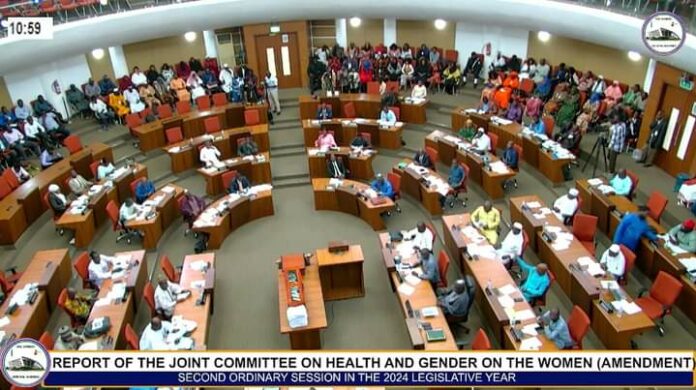By: Alieu Jallow
In the ongoing heated debate over the repeal of the ban on FGM/C, several parliamentarians have raised questions about the integrity, empirical data, proof of funding for their trip to Egypt, and death certificates related to FGM/C.
Almameh Gibba, the champion of the Women Amendment Bill 2024, expressed his frustrations, believing his fellow parliamentarians have betrayed the trust of the Muslim ummah. He criticized the bias he perceives in the joint committee’s consultations, arguing that his counter-consultation contradicts the committee’s findings. He emphasized that many people are left in the dark and are prepared to vigorously defend their right to practice their religious beliefs, even resorting to extreme measures.
“I believe this report is inadequate and influenced by Western donors. I question why the committee has omitted Section 32 on cultural rights from their report. Similarly, Section 25(1)(c) on religious rights is not adequately addressed. Section 4 on the supremacy of the law should guide these matters,” he remarked.
Echoing similar sentiments, Lamin Ceesay, the National Assembly Member for Kiang West, emphasized that the report is insufficient. He pledged to protect his religion and culture and demanded explanations regarding the financial gains attributed to circumcisers in the committee’s report. He also criticized the report for its lack of evidence regarding deaths related to FGM/C, questioning its scientific basis.
“Despite gathering evidence from medical experts, there is no documented case of death caused by female genital mutilation, nor is there evidence of any health consequences. What scientific evidence are you referring to? We need credible, tested data. The Supreme Islamic Council and medical experts cannot provide evidence of a single death from female circumcision,” he challenged.
He also demanded answers regarding the sponsors of the joint committee’s trip to Egypt.
Disassociating herself from the committee’s report recommendations, Isatou Colley, the NAM for Foni Brefet, alleged that the proposed agreements to meet various communities and stakeholders in different constituencies were never fulfilled.
“We agreed to conduct public hearings with various stakeholders, which the committee failed to do. As a member of the committee, I do not support this report in its entirety,” she declared.
This report has sparked extensive debate, dividing Parliament into factions. The next stage involves the Assembly’s consideration of the Bill, clause by clause, scheduled for July 16, 2024.




